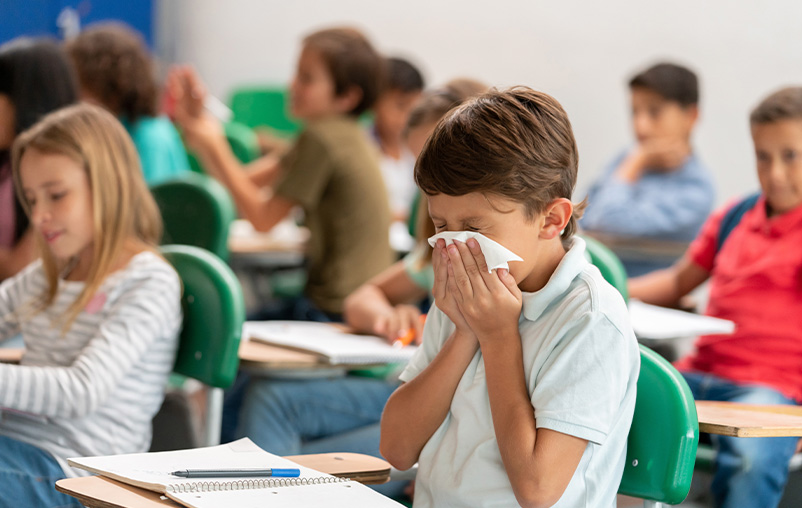Do you get an itchy nose or watery eyes in the spring? You’re not alone. The Centers for Disease Control and Prevention estimates about 1 in 4 American adults experience seasonal allergies. In South Texas, springtime brings rising temperatures and blooming oak, ash, pecan and elm trees—dust and pollen swirl in the air, irritating throats and noses.
Keep reading to learn the best ways to avoid the headache of allergies during the upcoming peak pollen season in April and May.
Allergy Symptoms
Allergy symptoms can include:
- Sneezing
- Nasal congestion
- Red eyes
- Cough
- Sore throat
- Itchy rash
Allergies can even trigger more serious illnesses, such as asthma, which affects millions of Americans.
Environmental Allergies
Allergy symptoms occur when your body’s immune system overreacts to something unfamiliar, like tree pollen. Your body releases a chemical called histamine to fight off the “invader,” which causes a slew of unpleasant symptoms like sneezing, watery eyes, itchy nose, hives and runny nose.
In addition to tree pollen, other common environmental allergens include:
- Pollen from grasses and weeds
- Dust mites
- Animals/pets
- Pests like cockroaches and mice
- Mold and mildew
How to Manage Springtime Allergies
Air Filters and Purifiers
By using air filters and purifiers, you are keeping the air in your home clean and free of the tiny particles that can trigger allergy symptoms. According to the Environmental Protection Agency, high-efficiency particulate air (HEPA) filters remove about 99% of the home’s dust, pollen, dander and other allergens.
Over-the-Counter Allergy Medications
You can buy many allergy medications without a prescription (over-the-counter).
Taking allergy medications and antihistamines before you experience your worst symptoms is most effective. You can even take medications before you develop allergy symptoms, starting up to a few weeks before allergy season starts. This will help prevent your body from releasing histamines, which causes all of your most uncomfortable allergy symptoms like sneezing, watery eyes, congestion, rashes, etc.
Helpful over-the-counter allergy medicines include:
- Antihistamines, which block the release of the histamine chemical:
- Oral
- Zyrtec (cetirizine)
- Allegra (fexofenadine)
- Nasal spray
- Astelin (azelastine)
- Flonase (fluticasone)
- Decongestants, which relieve congestion and sinus pressure
- Mucinex (guaifenesin)
- Sudafed (pseudoephedrine)
- Eye drops
- Pataday (olopatadine)
- Zaditor (ketotifen)
- Oral
It’s important to note that some oral decongestants may worsen hypertension. Ask your doctor before taking over-the-counter medicine.
Nasal decongestants like Afrin can cause rebound congestion, in which your body depends on the medication to keep you decongested. Take this medication as instructed on the packaging and reach out to your doctor if you have any questions or concerns.
Home Remedies
Sinus washes, saline sprays and essential oils, like eucalyptus and menthol, can help open nasal passages and make breathing easier from your nose. You can also reduce pollen buildup in your home by changing clothes when you return after spending an extended period outdoors, showering to remove pollen dust from your hair and body, and changing your bed sheets more frequently.
Avoid Outdoor Allergens
Monitor pollen levels in your area with The Weather Channel or local news broadcasts like KSAT and KENS5, which report pollen levels along with the weather report. Using these resources, you can better coordinate and plan outdoor activities on days when the pollen count is predicted to be lower.
When to See an Allergist
Home remedies and over-the-counter medicine may not be enough to keep your allergies at bay. Make an appointment with a University Health allergist at any time to:
- Get advice for managing seasonal allergies
- Get allergy testing to understand what triggers your symptoms
- Start allergy shots to better control symptoms
- Manage allergy medications
Allergy Care at University Health
If you suffer from bad allergies, talk to your primary care provider about being referred to one of our allergy specialists.
We offer advanced allergy care for adults and children experiencing common allergies.





